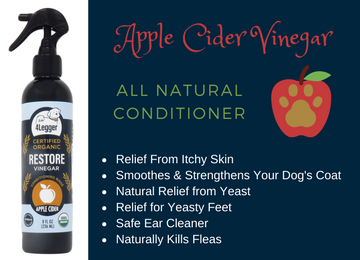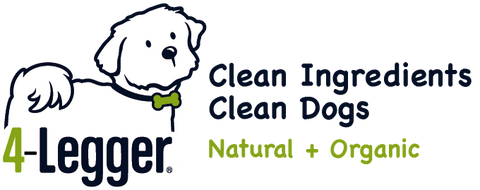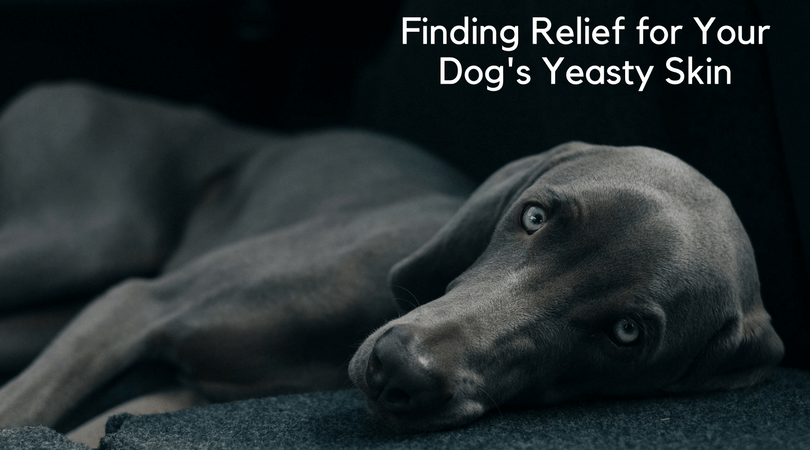A Holistic Approach to A Yeast Infection In Your Dog
Yeast are single cell fungi or fungus that are both on and in your dog as part of their normal physiological flora. The most common cause of canine yeast skin infections is a fungus called Malassezia pachydermatis.
When your dog's immune system is stressed (often referred to as depressed) or they have sensitivities to food, environmental toxins or the environment, the yeast will proliferate in the hair follicles and throughout your dog's body.
How Do You Know If Your Dog's Itchy Skin Is From Yeast?
The short answer is - you don't without a proper diagnosis! The first indicator is your dog will scratch... and chew... and scratch ... and chew.
As it goes on you may notice dark spots on your dog's belly - or black dots at the hair follicles. As they chew and bite, the dark spots will turn their coat red on their belly and under their arms (arm pits). As the yeast continues to proliferate, it can spread resulting in a miserable dog with red and flaky skin, oozing wounds, hair loss, greasy texture, with a definite unpleasant smell.
In short - it will break your heart.
This is an early stage yeast infection where you can see the dark spots at the hair follicle and then the skin and coat turning reddish after licking and chewing.

Left unresolved, the yeast can continue to spread and may cause secondary infections. In fact, many times yeast is itself a secondary infection to a bacterial infection.
Triggers for Yeast Overgrowth
While there are many triggers, the two most common are food (including treats) and a compromised immune system.
Food Sensitivities: Feeding your dog food and treats that are high in carbohydrates (which break down into starch and sugar) and starches (which break down into sugar) are the most common triggers for setting off a yeast infection in your dog.
If you missed our article on the link between your dog's food, grain free food, carbohydrates, starches, sugar and yeast infections in dogs, you should read it now!
Compromised Immune System: My own dog's immune system is compromised from over-vaccination (learn more here). Ever since she had a rabies vaccine reaction she has been what I refer to as a reactive dog.
If I feed her a piece of apple she will get itchy. Give her a treat that is high in carbs and within 24 hours she will be an itchy mess.
Another 24 hours and you may see black spots on her belly at the hair follicles starting near her anus or on her belly. Soon, her skin will be warm to the touch and may look more pink.
Seek Veterinary Assistance
As a member on many holistic groups on Facebook I see a LOT of dog pictures and a lot of pet parents trying to do the best they can for their furry family member.
It breaks my heart to see a dog with bright red irritated skin. It also breaks my heart when the pet parent is trying to solve the problem with whatever is recommended by the Facebook community without a proper diagnosis from a veterinarian.
I get it.
You don't have an integrative or holistic veterinarian near you (click here to find an integrative or holistic veterinarian) and you are worried about taking your dog to a traditional veterinarian because you don't want them on Apoquel or Cytopoint.
I too have had that conversation with my own traditional veterinarian. I explained to my veterinarian that I didn't want a "drug patch" for my itchy dog that may further compromise her immune system. I've read the research and I'm not comfortable despite her assurances, in giving my dog prescriptions based on short term "safety" studies.
While these drugs are effective at stopping the itching (I'll not delve into the mechanism of how), they do not solve the underlying problem. They provide temporary relief of the symptom while further compromising the immune system.
Your dog's itchy skin is trying to tell you something is wrong. Itchy skin is a symptom - not a diagnosis.
While some pet parents will opt for these drugs and the itchy skin goes away, the problem has not been treated and it will likely come back. Only next time, your dog’s immune system is even more taxed because it has still been working overtime even when the itchiness seemed to be controlled. Sadly, it will now be even harder to break the cycle and find true relief for your dog.
It may be food. It may be over-vaccination. It may be a sensitivity to something in your household like the laundry detergent, fabric softener, or scented candles. It may be lawn chemicals in your neighbor's yard! It could be a lot of things but it is not an impossible puzzle.
It is your job as their parent to solve the problem so they aren't dependent on a drug to mask the symptom. Find the root cause and solve it!
Be firm and offer your veterinarian assurances that you are committed to finding the cause - because I know you are!
So what did we do with our itchy dog? We took her to our vet and asked for a skin scrape to determine if yeast was in fact the problem, as we suspected.
Once the skin scrape was done on my dog and we looked under the microscope we found yeast and dead skin cells. She was prescribed a 42 day course of Ketocanazole.
Ketocanazole is an anti-fungal class of medication that has been around a long time and even though it is a different class of drug, it is considered safer than Apoquel and Cytopoint - more importantly it addresses the clinical diagnosis - an overgrowth of yeast.
Once this was prescribed and administered, she was less itchy within just days! But not because the itchiness was being masked - but because the medicine was actually treating the yeast infection.
Watch your dog carefully while on ketocanazole as it can cause reactions and talk to your veterinarian if your dog has a side effect from the medication.
Work with your veterinarian to mutually agree on a course of action that is safe and effective for the diagnosis but don't avoid going to the veterinarian and let your dog suffer needlessly.
Meet Herbie
Herbie was a great example of a dog with a yeast infection and secondary infection that was given drugs to mask symptoms further compromising his immune system.
He had just finished a month long course of Cytopoint. After getting a bath with a medicated ketocanazole shampoo, his red inflamed skin got worse and the redness spread over his whole body.
Once Herbie got an actual diagnosis (yeast with secondary bacterial infection) he was put on Ketocanazole and Cephalexin (antibiotic) and had 4-Legger Organic Aloe Dog Shampoo baths!
As you can see his skin calmed down and he was finally able to relax (after 5 months of battling infection).

His Mom was overjoyed at the transformation!
She has also started to support his immune system with essential oils.
Sadly, as soon as Herbie completed treatment his infections came back as his immune system had been compromised from Apoquel and other quick fixes.
Let me be very clear. We are not in any way putting down or blaming Herbie's Mom for trying different solutions to get Herbie relief. She did the best she could with the information she had at the time.
She, like many of us, listen to the evidence and solutions presented with one goal in mind - make our beloved 4-legged furry family members feel better - period.
These treatments sound like a silver bullet and who wouldn't want a silver bullet when your sweet boy is so miserable?
Herbie's Mom is a rock star and we commend her for all of the research and work she is putting into getting relief for Herbie.
Once the immune system is compromised yeast and bacterial infections are very difficult to clear. It truly takes layers and layers of support and often months and months treatment.
A Holistic or Integrative Approach to Your Dog's Yeast Infection
A lot of people mistakenly think holistic or integrative means "no prescriptions". Wrong. It actually means supporting the entire body as a whole since everything is interconnected. Supporting your dog's body means regulating everything that comes in contact with your dog!
Food & Treats
First and foremost - address the food and treats. The yeast cycles will continue until you eliminate the triggers. Since food is the biggest trigger - research the amount of carbs in your dog's food and change if warranted.
If the carbs are very low, your dog may have a sensitivity to the protein in the food and treats he eats (chicken for example). Is it hard to not give your dog that piece of peanut butter banana treat? Yes. Those sweet soulful eyes lure you into wanting to give her a few.
Stay strong! Instead give them a single ingredient treat their system can tolerate.
You may have to do elimination trials to find the exact triggers your dog is sensitive to.
Leaky Gut
Leaky gut, or dysbiosis, is a bacterial imbalance in the gut that leads to inflammation of the intestinal mucosa. Once inflamed, the intestinal lining is compromised - allowing undigested food particles and other potential toxins to enter the bloodstream.
Every case of leaky gut is unique to that dog. There is no silver bullet here either. Each dog needs a customized healing protocol starting with a species appropriate diet, supplements to address the inflammation, essential oils to support inflammation and healing, and often prebiotics, probiotics, and digestive enzymes.
Keep in mind, once the body is reactive, it can be reactive to everything. Your dog's body can start to see food as the enemy and become reactive to almost every protein, vegetable, and grain leaving few options when it come to feeding.
Your dog may also be reactive to environmental triggers including grass, pollen, and more - leaving them in a constant state of inflammation.
Environmental Triggers
Often environmental triggers are thought of as grass and pollen.
It goes beyond that to include fabric softener, lawn chemicals, detergent, scented candles, household cleaners, traditional or low quality dog shampoo, and more.
Look for anything with artificial or synthetic ingredients and try (if possible) to eliminate it from your dog's life.
Medicated Shampoo to Treat Yeast Infections
When Herbie's mom used a medicated shampoo his delicate inflamed skin became more inflamed. This is not uncommon. We have a lot of pet parents who replace their medicated dog shampoo with 4-Legger's holistic dog shampoo as they are more naturally aligned with your dog's body.
We are strong believers that your dog's skin needs to be calmed - not medicated.
Our organic ingredients promote natural desensitization that helps to restore healthy skin for pets suffering from chronic skin conditions. The essential oils in our shampoos help to support the clearance of yeast and bacteria naturally.
Essential Oils To Support Clearance of Yeast Infections
Dog's with yeasty skin can also benefit from baths and spot treatments with YeastyBeasty™ - an animal safe essential oil blend that is formulated to aid in the decrease of fungus and bacteria while providing relief to inflamed skin.
You can also purchase 4-Legger's aloe dog shampoo and add Yeasty Beasty seperately for a powerhouse combo!
Ingredients in YeastyBeasty™
Essential Oils of Lavender (Lavandula angustifolia), Rosemary Verbenone Chemotype (Rosmarinus officinalis), Helichrysum (H. italicum), Lemongrass (Cymbopogon flexuosus), Geranium (Pelargonium graveolens), Oregano (Origanum vulgare), Thyme (Thymus vulgaris), Tea Tree (Melaleuca alternifolia), Myrrh (Commiphora myrrha), Copaiba (Copaifera officinalis), Frankincense (Boswellia carterii), Clove (Eugenia caryophyllata), Cypress (Cupressus sempervirens), Basil (Ocimum basilicum), Lemon (Citrus limonum), Black Spruce (Picea mariana), Peppermint (Mentha piperita), Melissa (Melissa officinalis), Cinnamon Leaf (Cinnamomum zeylanica)
Apple Cider Vinegar Rinse Spray
4-Legger's Apple Cider Vinegar Spray Rinse for dogs is also very beneficial to help calm yeasty skin.
 When your dog scratches, the yeast is transferred to your dog's feet and gets under their nails.
When your dog scratches, the yeast is transferred to your dog's feet and gets under their nails.
A daily cleaning of the feet (yes, daily - you’ve declared a yeast war), with our Apple Cider Vinegar Rinse will help to keep your dog's feet clean so they don't continue to transfer the yeast back to their skin. Learn more about 4-Legger's Apple Cider Vinegar Rinse here!
Note: If you use YeastyBeasty™ in your dog's bath we recommend only using the Apple Cider Vinegar Rinse on your dog's feet so you won't wash off the benefits of the essential oils!
Thank you!
A HUGE thank you to Herbie's Mom, Morgan for sharing her story and pictures so other dog parents can see what to look for and learn. It is only by sharing our experiences and lessons learned that we can grow as a community. We wish both you and Herbie good health and healing. We so want sweet little Herbie to overcome his immune sensitivities and have a happy healthy life





